Harold’s Challenge for a Better Answer to War; Wren’s Answer: Blue Jellyfish and The Line of Other
[Harold, an osteopath from Virginia, is pictured above teaching tantra--quite a peaceful practice itself!]
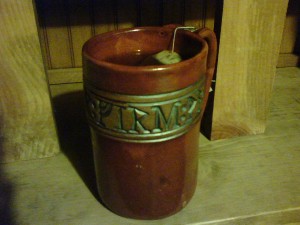 Now that I’ve had my tea, I’m thinking about the human history of war and peace. Within Heathcote, my Intentional Community, everyone who lives here commits to our conflict resolution policy. It’s developed by consensus, so members who see improvements to be made in our process can bring them up. It’s a living, evolving agreement. But it’s only practiced among those who stay. Someone, for example, with a strong need to be right can just say, “This is bullshit,” and leave. The members who stay with Heathcote’s culture of processing end up being of similar temperament, having tremendous patience and commitment not to their own plan but to the higher good. So within the bubble of Heathcote, the process works fairly well. Extending that bubble to the entire planet is another issue. I can’t even get Heathcote’s neighbors to return my calls to meet with me about our beaver issue. I don’t feel equipped to stop a war among those determined to have one.
Now that I’ve had my tea, I’m thinking about the human history of war and peace. Within Heathcote, my Intentional Community, everyone who lives here commits to our conflict resolution policy. It’s developed by consensus, so members who see improvements to be made in our process can bring them up. It’s a living, evolving agreement. But it’s only practiced among those who stay. Someone, for example, with a strong need to be right can just say, “This is bullshit,” and leave. The members who stay with Heathcote’s culture of processing end up being of similar temperament, having tremendous patience and commitment not to their own plan but to the higher good. So within the bubble of Heathcote, the process works fairly well. Extending that bubble to the entire planet is another issue. I can’t even get Heathcote’s neighbors to return my calls to meet with me about our beaver issue. I don’t feel equipped to stop a war among those determined to have one.
 Yet the yield of any war that humans have waged has only ever been some land grabbing (creating historical amnesia and generational resentment for millennia, as pointed out in my favorite t-shirt, to the right), some winners, some big losers and countless dead. Still, my own generation continues this tradition, this entitlement to tunnel vision. I wonder how evolved we really are. Am I wrong to believe that we have the capacity to come together as humans planetwide?
Yet the yield of any war that humans have waged has only ever been some land grabbing (creating historical amnesia and generational resentment for millennia, as pointed out in my favorite t-shirt, to the right), some winners, some big losers and countless dead. Still, my own generation continues this tradition, this entitlement to tunnel vision. I wonder how evolved we really are. Am I wrong to believe that we have the capacity to come together as humans planetwide?
Last night I caught a nature program showing the blue jellyfish. Its body is a bubble shaped to act like a sail. But half the creatures have their body sails pointing them left and half point right. So half sail out to sea to live life and procreate and half wash up on the beaches of Australia (see picture below). The randomness of evolution dooms half their population to death.
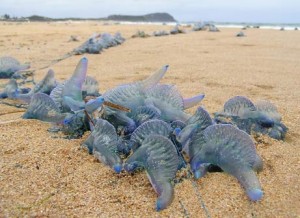 So even as I feel within me a tremendous capacity for peace, why should I assume that’s a universal human experience? How do nature and nurture influence a person’s ability to justify war, or violence of any kind?
So even as I feel within me a tremendous capacity for peace, why should I assume that’s a universal human experience? How do nature and nurture influence a person’s ability to justify war, or violence of any kind?
Maybe I should switch to herbal tea. But my answer to such questions has always been to make my own choices, such as living in community and buying in to our process, and being available as model/guinea pig for those who want to come and learn. Maybe, Harold, witnessing is my personal answer.
A huge influence on the actions of humans seems to be what I call the line of other.
Individuals and cultures have this invisible line they cast out around them. Some people and living things are on their side of the line–family, friends, community, pets, nation. Then there are living things and people that are outside of this line–plants and animals one eats, other nations, people who are different in some triggering way. The line defines how we treat others. If you’re inside someone’s line, The Golden Rule applies. If you’re outside someone’s line, it does not. They can torture animals in factory farms and slaughter houses because they’re not like “us,” they’re “other.” They can invade another country with no obligation to understand its people’s culture or objections because they’re “other.” The line of other creates an impunity that terrifies me.
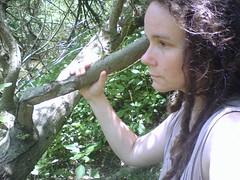 I hope my life and my choices help to negotiate a collective moving out of that line of other to include all life on Earth and the planet itself. I try to model this in my Open Classroom teaching, promoting fair trade with Heathcote Earthings and inviting dialog on Hippie Chick Diaries.
I hope my life and my choices help to negotiate a collective moving out of that line of other to include all life on Earth and the planet itself. I try to model this in my Open Classroom teaching, promoting fair trade with Heathcote Earthings and inviting dialog on Hippie Chick Diaries.
I get frequent emails from partners in this work who are fearful of humanity’s direction and impatient to make major changes.
Looking at the systems of nature, as Permaculture teaches me to do, I see that lasting change happens in two ways–catastrophically and incrementally.
War and natural disasters are catastrophic changes. They happen without my help, and will continue to. I don’t wish for them, as some do. I try to make my peace with their rhythms and minimize my carbon footprint. Incremental change feels more peaceful to me and I am satisfied with my little victories of having information about sustainability or Intentional Community when someone comes asking, or witnessing for animal rights or human rights when I hear someone being intolerant. And I live as lightly as I can every day. I’m not a monk but I’m not a soccer mom, either.
Maybe, Harold, walking my talk for those who will notice is my answer. And like every creature that evolves, my answer is a work in progress.
I’m looking forward to everyone’s thoughts!
–Wren Tuatha
Join our Hippie Chick Diaries fanpage on facebook!
Subscribe to this blog's RSS feed
Sense of Place: Ravenkeeper’s Playwrights’ Retreat
Greta Fields’ neighbors over the ridge are strip mining. Greta is planting wildflowers. The contrast is palpable as Greta tells me of pressure from the mining company to sell her land. Greta has other plans.
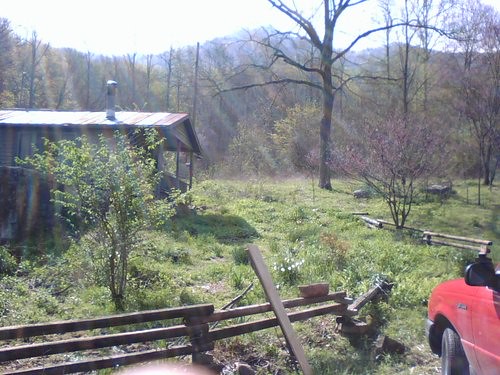
“I thought of calling this place Mine Pony Farm, to honor all the ponies who lived here and died in the mines,” she muses between pointing out and naming bunches of flowering plants in the understory. We walk in and out of woods on her land, a mountain, actually, in Appalachia. She was raised in these mountains and is clearly as rooted and natural here as the flowers and fruit trees she’s sown.
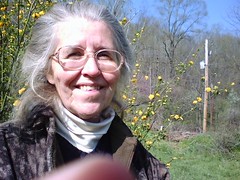 Her family has a rich love of the theater and Greta has authored several plays. Her ties to the regional and national arts communities lead to the brainstorm of turning her farm into a playwrights retreat, complete with homes for writers and actors and a stage, where playwrights can hear their works in progress performed.
Her family has a rich love of the theater and Greta has authored several plays. Her ties to the regional and national arts communities lead to the brainstorm of turning her farm into a playwrights retreat, complete with homes for writers and actors and a stage, where playwrights can hear their works in progress performed.
She’s well on her way. Many fledgling groups struggle to find and purchase land. Greta has plenty of land, owned outright, and she’s researching putting it in land trust. Often getting the first houses on the land is an ordeal. Her farm has 4 homes and a trailer now. The single story homes range from one to three bedrooms, with complete kitchens and baths. All have been rewired. At the moment, all need some repairs. She used to maintain them herself, but she’s been away from the property attending graduate school and now she’d like to hire or trade with a handyperson or caretaker who will occupy the farm during the work.
 Greta has a biocentric (life centered) philosophy and she protects and nurtures a population of rare, large ravens on her land, hence her online moniker, Ravenkeeper.
Greta has a biocentric (life centered) philosophy and she protects and nurtures a population of rare, large ravens on her land, hence her online moniker, Ravenkeeper.
I’m excited at the possibility of preserving Greta’s farm in land trust, protecting it from unsustainable practices and holding it instead as a platform for exploring and preserving the rich cultural and arts traditions of Appalachia. “ I used to think the idea of ‘Appalachian place’ was meaningless,” explains Greta, “Now I realize it is everything. If you lose your sense of place, you lose your soul.”
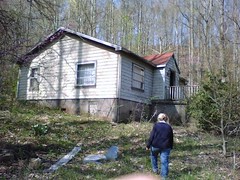 Few words could be more powerful for me, as I visit Greta directly from visiting my family farm in Bloomfield, Kentucky. Our farm as been in our family since the land grant days. It has always been a touchstone for me, a living soul I sometimes call my “second grandmother.” I wrote my screenplay, Bacca Blooms, as an exploration of my bond with our farm and the generations of my bloodline there.
Few words could be more powerful for me, as I visit Greta directly from visiting my family farm in Bloomfield, Kentucky. Our farm as been in our family since the land grant days. It has always been a touchstone for me, a living soul I sometimes call my “second grandmother.” I wrote my screenplay, Bacca Blooms, as an exploration of my bond with our farm and the generations of my bloodline there.
As I approach 14 years of life in the woods of Heathcote Community, I ponder how mobile our society really is. During this trip I heard an NPR report that more than half of the human race is now living in urban settings. So few of us put down roots and sit still with any piece of land for very long. What are we denying ourselves? This loss must diminish us. No wonder so many humans can’t view their purchasing and lifestyle choices through the filter of their impacts on the environment. Their choices so rarely come directly back to them. And the land doesn’t get the time to “speak” to them, as when we slow down, getting still and wordless.

 Greta has many of the elements in place to make a difference on this piece of land, and to offer it as a sanctuary to artists who might then spread their “sense of place” to the world. Who can help her with the next step, which is getting her houses ready for artists? The caretaker should have carpentry, plumbing and electrical skills and be able to work independently with direction. And s/he should be prepared for rustic living, these are the mountains. There are snakes, bobcats and bears. Nature is not a Disney movie!
Greta has many of the elements in place to make a difference on this piece of land, and to offer it as a sanctuary to artists who might then spread their “sense of place” to the world. Who can help her with the next step, which is getting her houses ready for artists? The caretaker should have carpentry, plumbing and electrical skills and be able to work independently with direction. And s/he should be prepared for rustic living, these are the mountains. There are snakes, bobcats and bears. Nature is not a Disney movie!
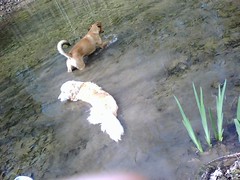 If you’re interested in being a caretaker or getting involved with Greta’s farm in another way, contact her via her gaia.com profile.
If you’re interested in being a caretaker or getting involved with Greta’s farm in another way, contact her via her gaia.com profile.
If you’d like to find an Intentional Community near you, or just learn more about it, join our gaia group.
Shut Up and Talk to Me
 Wow, talking bes hard. The communi in communicate is so true–If you don’t get the other person to buy in to finding a solution to the problem or conflict between the two of you, then you’re an unhooked battery, all charge and no current.
Wow, talking bes hard. The communi in communicate is so true–If you don’t get the other person to buy in to finding a solution to the problem or conflict between the two of you, then you’re an unhooked battery, all charge and no current.
Intentional Community is a laboratory for communication and conflict resolution.
At Heathcote Community, all members agree to a flexible process for addressing conflicts in a timely manner, and we agree on certain rules of engagement. If I have an issue with Jane Heathcoter, I’ve agreed not to carry it around, stewing in my juices. I must ask her for a “checkin.” Depending on the voltage of the charge, Jane and I might
- sit down one on one
- ask another Heathcoter to mediate or
- take our issue to the entire community for help and support.
This is what new members can’t always prepare for in advance: Intentional Community is a fishbowl, a small one. Everyone else sees your baggage. They’ll be impacted by it and call you on it. Processing this is the deepest, hardest, most sacred work of community. Sustainable living, beautiful scenery and community dinners are in a way just the trappings of it.
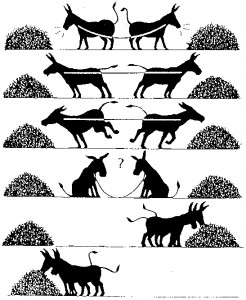 Some people have the self knowledge that this is work they dream of doing. Others have the wisdom to know it’s not for them. Some believe intellectually that they want this, but are shocked by how hard the work is, how bruising to the ego, and how hard that ego is to put down. Good communication is a skillset, not just good intentions.
Some people have the self knowledge that this is work they dream of doing. Others have the wisdom to know it’s not for them. Some believe intellectually that they want this, but are shocked by how hard the work is, how bruising to the ego, and how hard that ego is to put down. Good communication is a skillset, not just good intentions.
In my thirteen years of observing communication and conflict resolution at Heathcote and other communities, I’ve come to recognize these components in successful processing:
- each speaks her or his truth without agenda or manipulation, sticking to facts and speaking from experience, putting down that ego and the need to be right or wise
- each listens so as to understand the speaker’s experience, walking that mile in her or his moccasins–”Oh, that’s how it is for you…” putting down filters, not preparing for debate
- everyone looks at all the cards on the table, looking not for the solution they had in mind at the beginning, but for the win/win that arises from new understanding and acceptance of each other
Even after thireen years in the fishbowl, I still fall into all the traps of bad communication. But I try hard and, because of the sacred work we’ve done, I’ve created trust and mutual respect with my long time community mates. I have enough safety to bring them just about any subject and speak with transparency.
At Heathcote we’ve brought in outside trainers to improve our skills in conflict resolution and consensus, as well as meeting facilitation. We’ve added to our communication “toolboxes.” Many of us have found processes like Zegg Forum, Non-Violent Communication and Imago very powerful and helpful.
Are you seeking community where you can have lovingly honest relationships with your friends? Do you want to learn skills of sharing and listening without agenda, noticing when you get triggered and looking at the causes?
Do you live in community now? I’d love to hear your adventures in conflict resolution!
I often say that Intentional Community is the toughest gift you’ll ever be glad you opened. If you’ve been considering seeking community, I’m inviting you in. Now that you know about that secret gift, welcome to the fishbowl.
Meet you in the deep end!
–Wren Tuatha
Chelas Is a Show Off
One festival vendor’s loss was Heathcote’s gain this week.
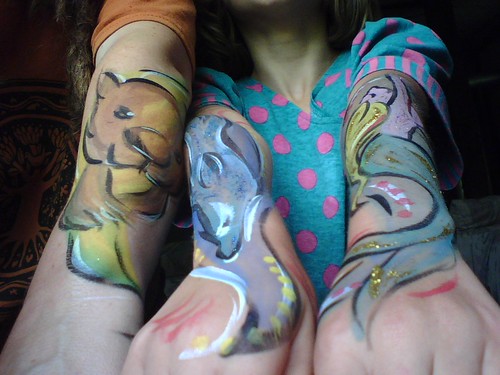
Chelas the Instigator, a very talented, creative body painter, hung out in my Intentional Community when her scheduled gig fell through. Above, see my wombat, a dolphin and a mermaid!
Chelas was very open with her paints and her energy. I thought about the image of the spring maiden/goddess, flowers sprouting from her footsteps, leaving green in her wake. Chelas is one of those sweet people who spreads festival spirit wherever she goes.
She calls her body art business Chelas is a Show Off. She paints with makeup, as above. Or she can give you a temporary tattoo of your design, which lasts up to a week.
She was able to visit a friend here and explore community because her scheduled festival, Jambaloosa, seems to have been a scam, designed to trick vendors out of their booth fees, in this case, $300.
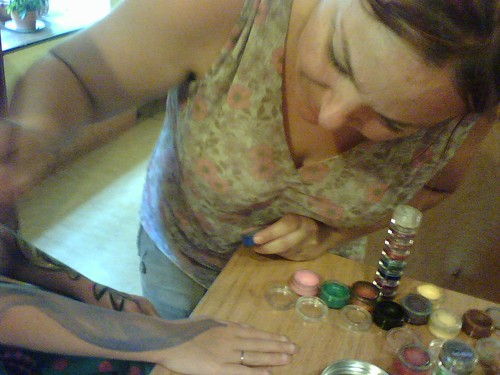
Chelas and I, as professional vendors, had to give the scammers points for creativity. I’ve never heard of or encountered such a scam before. I hope it doesn’t become a trend.
Discussion threads on jambase.com show chaos and confusion around some last minute cancellation of the event. I’ll have to investigate further to see if any fees have been refunded or if authorities have been notified of a possible scam. The festival’s website domain name is now up for sale and advertising porn.
Festival goers may not appreciate that my festival business, Heathcote Earthings, which occupies a double booth, pays anywhere from $70 to $1800 in booth rent, depending on the venue and duration of the event. Plus, we’re often charged extra for a corner or two. We may not take the same risks as a brick-and-mortar store, but Earthings, Chelas and other festival circuit riders do have high costs of doing business, especially with today’s gas prices!
I wish Chelas the Instigator and her sweetie, Peter, joy in their travels, spreading that festival spirit wherever they go! Stay in touch!
Waiting for the Beaver to Emerge: The Heathcote Childhood I Should Have Had
The Heathcote kids and I have just finished another typical day. We played store, in which the kids “bought” raspberries and mint which they picked and ate on the spot. We visited the beaver dam and nearby lodge and had a stakeout, waiting for the beaver to emerge (not today; stay tuned). While in the beavers’ marsh, we identified beaver trails and footprints (huge claws!) and deer tracks, human tracks, muskrat holes and otter slides.
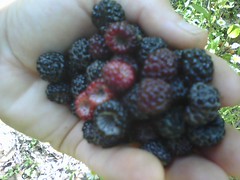 Then we walked about half a mile of road and trail, grazing on black raspberries constantly. I saved a handful to mix into my shelties’ vegetarian dog food while the kids played house at Polaris, the soon-to-be-occupied strawbale group house. Then we all went on a stroll in the woods with my dogs and pygmy goats, ending at my homestead, where the kids enjoyed a couple of rounds on my swings before they turned and continued to Heathcote’s mill without me.
Then we walked about half a mile of road and trail, grazing on black raspberries constantly. I saved a handful to mix into my shelties’ vegetarian dog food while the kids played house at Polaris, the soon-to-be-occupied strawbale group house. Then we all went on a stroll in the woods with my dogs and pygmy goats, ending at my homestead, where the kids enjoyed a couple of rounds on my swings before they turned and continued to Heathcote’s mill without me.
The families at Heathcote, the Intentional Community where I live, are choosing the gift of a pretty amazing childhood for their children. Instead of being plugged into media for long hours each day, these kids spend most of their time outdoors, year round. They have secret “rooms” along the stream where they swim. They have adopted a grove of pet trees in one such area, giving each tree a name. And they established an animal graveyard, where they lay the bodies of mice, baby birds, etc., watching nature recycle.
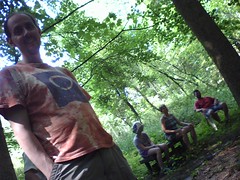 They’re fascinated with the Heathcote labyrinth, streamside in the woods. They’ve always gone there and invented their own sacred rituals. At our recent quarterly retreat, the kids watched as the adults performed our own labyrinth ritual, one after another, walking the spiral in silence. The children sat and held space for the long service. I wondered what they were thinking…
They’re fascinated with the Heathcote labyrinth, streamside in the woods. They’ve always gone there and invented their own sacred rituals. At our recent quarterly retreat, the kids watched as the adults performed our own labyrinth ritual, one after another, walking the spiral in silence. The children sat and held space for the long service. I wondered what they were thinking…
When I was a child I spent endless hours walking our family farm in Kentucky with garter snakes in my pockets and a Tom Sawyer sense of adventure, exploring barns, ponds, woods and fields and riding ponies (after the long ordeal of catching them). I would come home good and muddy with the understanding that I was an animal, carrying stories I knew the grownups wouldn’t understand. Heathcote would have been a primal paradise to me.
Naturally, the Heathcote kids take an extremely idealist view of animals and nature, as I did. To them, the woods and stream of Heathcote are a peaceful, benign, friendly place, their backyard. They’re not growing up on a farm, learning that your 4H project calf is a pet one season and dinner the next. They’re not on the historic American frontier or a small village in India, where nature is a cougar, wolf or a tiger, after your livestock…or you. For them, in modern rural America, even with snakes and snapping turtles that look like dinosaurs, the woods are a friendly home. The biggest boogeyman is the deer tick, which may or may not give you lyme disease, for which medicine is readily available.
They are growing up on another kind of frontier, though. In community, kids as well as adults work on improving our communication, experimenting with better ways of honesty and listening–No matter how old you are, feeling heard is core. Here the kids have a front row seat for the work the adults are doing. And in Open Classroom, they have a safe container for this essential work of community building. It’s no coinsidence that community and communication have the same root!
Seven Hippie Words to Remember George Carlin
With the recent passing of comedian George Carlin, I sat down to remember him in a way I hope he could appreciate. Here are seven words for him:
1. Ponytail. Every man who wants to be president, or who wants my vote or attention for any reason, should be required to grow and wear a ponytail in public. Let’s put a little bow in it, in honor of George Washington while we’re at it. You’re all on notice: News guys, cops, the hair is getting just way too short around here. You’re not excused, Jon Stewart, get growing…
2. Booger. Fictional tv dj Dr. Johnny Fever lost his old radio gig for saying “booger” on the air. The boys of South Park want to win the right to say “shit” on cable. But they’re just shadows of George Carlin, who took art to the Supreme Court for us all with “Seven Words You Can’t Say on TV”. If you can’t speak “shit” to power, what’s the point in having the right?
3. Playgay. I just made that up. But now it’s a word to honor all straight actors who lovingly play gay, which, even when Carlin did it in 1991’s Prince of Tides, could be risky. You go, gurrl! Love the ponytail…
4. Bug-eyed. Half of Carlin’s humor was in his expression when he exposed society’s absurdity. That’s art, when a performer on a blank stage can keep us engrossed in his/her mental universe, often with just a look.
5. Frisbeetarianism. Carlin’s religion. When you die your “soul gets flung onto a roof, and just stays there.” I also want to give a nod to his commandment, “Thou shalt keep thy religion to thyself.”
6. Payback. From the Life is Worth Losing show: “I look at it this way… For centuries now, man has done everything…to destroy, defile, and interfere with nature: clear-cutting forests, strip-mining mountains, poisoning the atmosphere, over-fishing the oceans…destroying wetlands and aquifers… so when nature strikes back, and smacks him on the head and kicks him in the nuts, I enjoy that. I have absolutely no sympathy for human beings whatsoever. None. And no matter what kind of problem humans are facing, whether it’s natural or man-made, I always hope it gets worse.”
7. Logicmonoger. “Well, if crime fighters fight crime and fire fighters fight fire, what do freedom fighters fight? They never mention that part to us, do they?”
And lastly, a bonus word,
7a. Ladder. Somebody with good equilibrium climb up on the roof and see if there are any frisbees up there.
–Wren Tuatha
The Mixed Blessing of Beavers
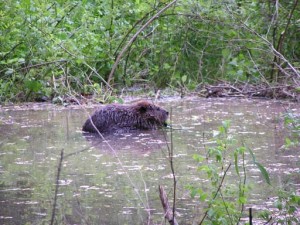 As if I weren’t busy enough myself, I’m taking on someone else’s backlog!!! A while back, a family of beavers built a dam on our neighbor’s land, right on the property line with Heathcote Community. The dam is on a part of the stream that humans had dammed back in the 1800’s with an impressive stone wall, diverting the stream for the Heathcote Mill. The mill eventually ceased operation, was later a horse barn, and has been Heathcote Community’s Conference Center for over 40 years. The pond the human dam created reverted back to marshy floodplane, filling in with soil. Bank-retaining trees, such as Japanese fantail pussywillow, have been planted along the winding stream.
As if I weren’t busy enough myself, I’m taking on someone else’s backlog!!! A while back, a family of beavers built a dam on our neighbor’s land, right on the property line with Heathcote Community. The dam is on a part of the stream that humans had dammed back in the 1800’s with an impressive stone wall, diverting the stream for the Heathcote Mill. The mill eventually ceased operation, was later a horse barn, and has been Heathcote Community’s Conference Center for over 40 years. The pond the human dam created reverted back to marshy floodplane, filling in with soil. Bank-retaining trees, such as Japanese fantail pussywillow, have been planted along the winding stream.
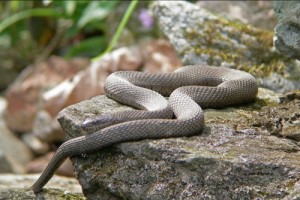 The most notable modern feature is that a driveway now runs along the top of that stone wall, accessing the properties of two Heathcote neighbors. Now that beavers have dammed the stream, their pond had flooded that driveway and cascaded over the stone wall, eroding the gravel and asphalt of the driveway and causing our neighbors to have to drive through a new stream when they come and go.
The most notable modern feature is that a driveway now runs along the top of that stone wall, accessing the properties of two Heathcote neighbors. Now that beavers have dammed the stream, their pond had flooded that driveway and cascaded over the stone wall, eroding the gravel and asphalt of the driveway and causing our neighbors to have to drive through a new stream when they come and go.
Since the beavers are actually on our neighbor’s land, Heathcoters had several academic discussions about them, but didn’t rush to action. One neighbor did, hacking a huge chunk out of the beaver dam and hauling it away in his pickup. It took the beavers only a few days to repair it, and the water level rose quickly over a few days, again threatening the driveway.
Beavers have a superficial reputation for being highly distructive of the environment, felling numbers of trees and flooding areas with their ponds. However, when you look at their activities in more depth, beavers are actually quite a blessing to an area like ours.
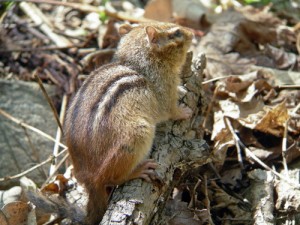 Shortly after our beavers established their pond in the tree filled, marshy area, a family of ducks appeared. Heathcote often has duck pairs pass through, visiting our pond and then moving on to more secluded areas. Now the valley has a safe area for them and I’ve been thrilled to see the babies. Another Heathcoter reports seeing a muskrat at the dam.
Shortly after our beavers established their pond in the tree filled, marshy area, a family of ducks appeared. Heathcote often has duck pairs pass through, visiting our pond and then moving on to more secluded areas. Now the valley has a safe area for them and I’ve been thrilled to see the babies. Another Heathcoter reports seeing a muskrat at the dam.
As soon as the beavers repaired the dam, I saw a family of otters arrive, including at least 3 young ones! This is more good news, not only because the beaver pond is becoming a habitat for a whole new range of wildlife, but beccause otters make holes in beaver dams (to allow larger fish to pass; easy catching on the other side) thus otter holes help mitigate flooding.
Further, the ponds that beavers create help the water table recharge by slowing down the stream and they deposit enriching minerals in the soil.
So how can Heathcote and our neighbors cohabitate with our beavers and their neighbors–ducks, muskrats and otters? I’ll be meeting with my neighbors in the next few days to discuss solutions I’ve researched. I’ll report back soon. I’d love to hear your experiences with beavers, too!
Lucky Pigs & Not So Lucky Pigs
 I heard a good one from Charlie, a customer at the Hunt Valley Mediterranean Festival. You can view it through whatever lens you want, vegetarian or carnivore. He was buying one of my three legged Peruvian lucky pigs ( a Ten Thousand Villages fair trade craft, pictured) for a friend who’s a pig farmer. The story goes that there was this three legged pig and folks asked the farmer how the pig came to have only three legs. The farmer explained that the pig had saved his entire family from a house fire–came in and woke everyone up and saved them all. The farmer waxed on and on about how they all loved the pig dearly are regarded it as one of the family. Since that didn’t explain the missing leg, folks would ask again, how did the pig come to have only three legs? Oh, said the farmer, a pig like that you don’t eat all at once…
I heard a good one from Charlie, a customer at the Hunt Valley Mediterranean Festival. You can view it through whatever lens you want, vegetarian or carnivore. He was buying one of my three legged Peruvian lucky pigs ( a Ten Thousand Villages fair trade craft, pictured) for a friend who’s a pig farmer. The story goes that there was this three legged pig and folks asked the farmer how the pig came to have only three legs. The farmer explained that the pig had saved his entire family from a house fire–came in and woke everyone up and saved them all. The farmer waxed on and on about how they all loved the pig dearly are regarded it as one of the family. Since that didn’t explain the missing leg, folks would ask again, how did the pig come to have only three legs? Oh, said the farmer, a pig like that you don’t eat all at once…
The Hunt Valley Mediterranean Festival does have some unlucky lambs and other critters being served. But it also has several vegetarian entrees and side dishes. Several Heathcoters came by and gave the fare high marks, so come on down! I’ll be sampling the falafel and stuffed grape leaves tomorrow!
Various Mediterranean dance troupes will be performing throughout the day. There are games for kids and several craft and food vendors, including a Middle Eastern grocery!
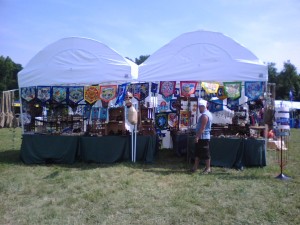 Heathcote Earthings is thrilled to own two new curved EZUp canopies. Not only do they perform well in the rain, but they make us easy to spot in a crowd (as if our batik flags and necklace branches didn’t do that already)! This is a view of our booth at the 2008 Maryland Faerie Festival.
Heathcote Earthings is thrilled to own two new curved EZUp canopies. Not only do they perform well in the rain, but they make us easy to spot in a crowd (as if our batik flags and necklace branches didn’t do that already)! This is a view of our booth at the 2008 Maryland Faerie Festival.
Hunt Valley Mediterranian Festival
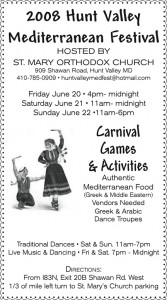 Heathcote Earthings just discovered a charming three day event north of Baltimore! Join us for the Hunt Valley Mediterranean Festival at St Mary Orthodox Church, 909 Shawan Road (just west of I-83 off exit 20). Organizers Kay and George have been very gracious to squeeze us in last minute and give us a nice booth location. You’ll see our tents draped in batiks of dragons and fairies as you drive in! I am so looking forward to the Mediterranean food, which often includes a few nice vegetarian choices, and the music and dancing.
Heathcote Earthings just discovered a charming three day event north of Baltimore! Join us for the Hunt Valley Mediterranean Festival at St Mary Orthodox Church, 909 Shawan Road (just west of I-83 off exit 20). Organizers Kay and George have been very gracious to squeeze us in last minute and give us a nice booth location. You’ll see our tents draped in batiks of dragons and fairies as you drive in! I am so looking forward to the Mediterranean food, which often includes a few nice vegetarian choices, and the music and dancing.
I must admit, even though I complain about shlepping boxes of rocks all over creation, I do love a festival atmosphere and I have a great job that gets me out of the house and bouncing to some kind of music every weekend!
Giving you more notice, let me call your attention to another wonderful music event, Common Ground on the Hill, at the Carroll County Farm Museum. Tom Paxton and many other great roots musicians are featured this year, and this event always draws an exceptional collection of artist vendors, several notable clothing vendors, and me! But the music is the reason you’ll want to come. Common Ground on the Hill always has at least three or more food vendors with vegetarian and vegan choices.
This year Common Ground on the Hill is starting a “Green to our Roots” area, with green non-profit information tables. Heathcote Community has been invited. Organizers are waiving the booth fee for non-profits this year (a $100 value), so if you’re a green group and would like to participate, check out their site!
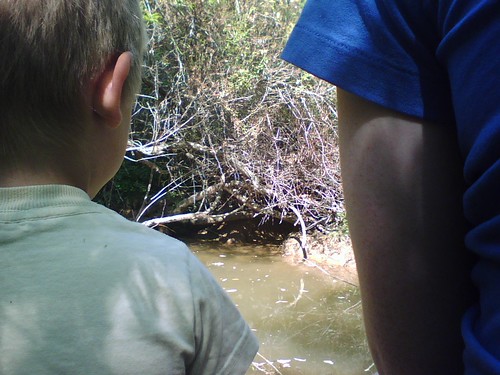

Hi. I really like your website. I noticed the photo of the sign outside your main building “War is not the answer”, but no suggested alternative. So I wondered if it would be more in line with your philosophy to offer what COULD be the answer? Maybe that should be a topic for discussion, leading to a second sign offering the new direction for those who would like to agree with the first one if they had any other ideas?
Harold, Hi! And thanks for visiting and commenting! Good idea to phrase things in the positive instead of the negative. I just woke up so all I have right now is, “Tea is the answer.” A good backrub would solve a few of my woes, too…
Funny that you make this comment now, because I’ve just spent a week intensely processing conflicts within the community and with some neighbors. And it’s clear that peace, or specifically conflict resolution, only works as an answer if all parties buy in. Still, you won’t catch me buying in to the war…